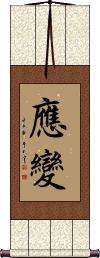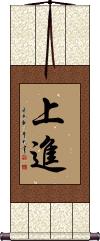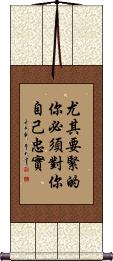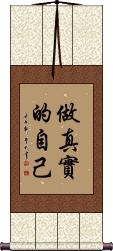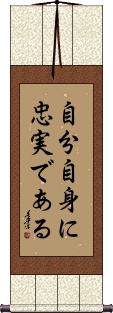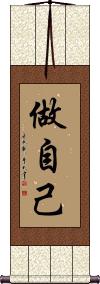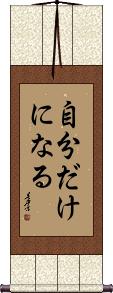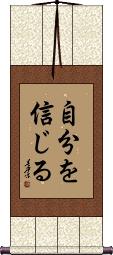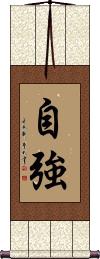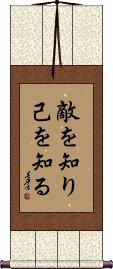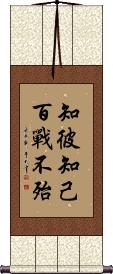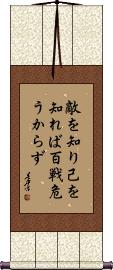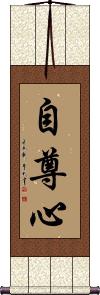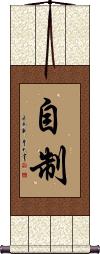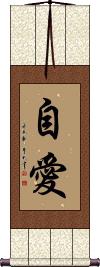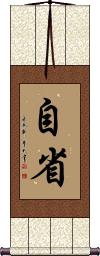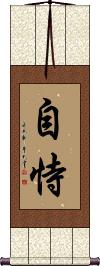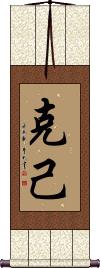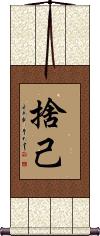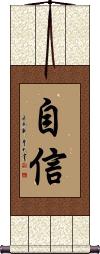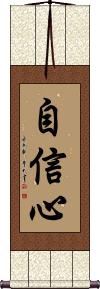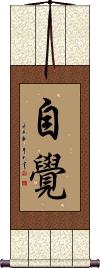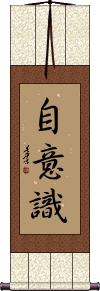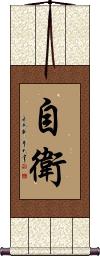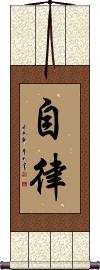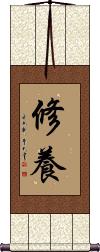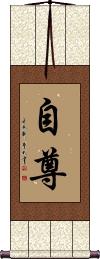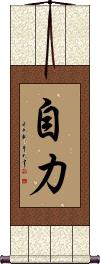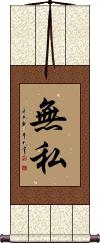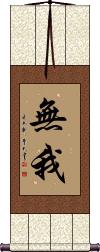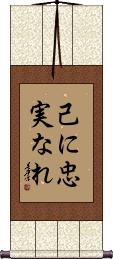Many custom options...
And formats...

The name Self in Chinese / Japanese...
Buy a Self calligraphy wall scroll here!
Personalize your custom “Self” project by clicking the button next to your favorite “Self” title below...
Switched to secondary search mode due to lack of results using primary.
These secondary results may not be very accurate. Try a different but similar meaning word or phrase for better results. Or...
Look up Self in my Japanese Kanji & Chinese Character Dictionary(My dictionary is a different system then the calligraphy search you just tried)
If you want a special phrase, word, title, name, or proverb, feel free to contact me, and I will translate your custom calligraphy idea for you.
2. Ambitious / To Improve Oneself
3. ...And this above all to thine own self be true
5. Be Yourself
7. Be Myself
8. Conquering Yourself is a Sign of Strength
10. Forgive Yourself / Release Yourself
11. Inner Strength / Self-Improvement
12. Jiko no Kansei / Self-Completion
13. Know Thy Enemy, Know Thyself
14. Know Your Enemy, Know Yourself, and You Cannot Lose
15. Know Your Enemy, Know Yourself, and Win 100 Battles
18. Prideful Mind / Self-Respecting Heart
19. Self-Control
20. Self-Love / Love Yourself / Love Oneself
21. Introspection / Self-Awareness
22. Changing Oneself / Self Reformation
23. Self-Reliance
24. Self-Restraint / Self-Control
25. Self Sacrifice
26. Self-Confidence
29. Self-Defense
30. Self-Discipline / Will-Power
31. Self-Improvement
32. Self-Respect / Self-Esteem
33. Power of Oneself / Self-Sufficient
35. Self Awareness Becomes a Buddha
36. Selflessness
37. Standing by Oneself / Walking by Oneself
39. True to Yourself
40. True Victory is Victory Over Oneself
Adapt Oneself
應變 means “to meet a contingency,” “to adapt oneself to changes,” or “to adapt to changes” in Chinese.
It's also used in Japanese but usually only in the context of Buddhism. 應變 is probably the shortest way to express the idea of adapting and overcoming whatever circumstances present themselves.
Ambitious / To Improve Oneself
Advance and Progress
上進 is a Chinese and Japanese Kanji word that means to advance, to make progress, to do better, to be ambitious, to improve oneself, or to move forward.
This can refer to a single person, general things (such as a work project), or a whole country.
In Japanese, this is sometimes used as the given name Joushin.
...And this above all to thine own self be true
A line from Shakespeare's Hamlet
Be True to Yourself
Be True to Yourself
Be Yourself
Be Yourself
Believe in Yourself
Believe in Yourself
自分を信じる means “believe in yourself,” “have faith in yourself,” or “believe in myself” (can be myself or yourself depending on if you're saying it to yourself or someone else).
Note: Because this selection contains some special Japanese Hiragana characters, it should be written by a Japanese calligrapher.
Be Myself
Conquering Yourself is a Sign of Strength
Forgive Yourself
Forgive Yourself / Release Yourself
我を許す is how to write “forgive yourself” in Japanese.
The first two characters mean “regarding myself.”
The last two characters mean “to forgive,” “to excuse (from),” “to pardon,” “to release,” “to let off,” “to permit,” “to allow,” and/or “to approve.”
Note: Because this selection contains some special Japanese Hiragana characters, it should be written by a Japanese calligrapher.
Inner Strength / Self-Improvement
自強 is the kind of inner strength that applies to a person who has will-power and can inspire themselves to do great things.
自強 can also be the creed of a person that always pursues self-improvement.
Other translations: self-strengthening, striving for improvement, self-improvement, striving to become stronger, and self-renewal.
Jiko no Kansei / Self-Completion
Know Thy Enemy, Know Thyself
This proverb is from Sun Tzu's (Sunzi's) Art of War.
It means that if you know and understand the enemy, you also know yourself. Four secondary characters come after this in the Art of War (not included here) which suggests you cannot lose a battle when you follow this philosophy.
In a very literal and somewhat-boring way, this can also be translated as “Estimate correctly one's strength as well as that of one's opponent.”
Know Thy Enemy, Know Thyself
敵を知り己を知る is the Japanese version of “know your enemy, know yourself.”
There is a longer version of this proverb that adds, “...and you can win 100 battles.”
Note: Because this selection contains some special Japanese Hiragana characters, it should be written by a Japanese calligrapher.
Know Your Enemy, Know Yourself, and You Cannot Lose
知彼知己百戰不殆 is from Sun Tzu's (Sunzi's) Art of War. It means that if you know and understand the enemy, you also know yourself, and thus with this complete understanding, you cannot lose.
This proverb is often somewhat directly translated as “Know the enemy and know yourself, and you can fight a hundred battles without defeat.”
It can also be translated as “If you know both yourself and your enemy, you can come out of hundreds of battles without danger,” or “Know your enemy, know yourself, and your victory will not be threatened.”
Know Your Enemy, Know Yourself, and Win 100 Battles
敵を知り己を知れば百戦危うからず is the longer/full Japanese version of this proverb. This means “Know your enemy, know yourself, and you will not fear a hundred battles.”
Others will translate this as “Know thy enemy, know thyself, yields victory in one hundred battles.”
Note: Because this selection contains some special Japanese Hiragana characters, it should be written by a Japanese calligrapher.
Love Myself First
Love Yourself First
This directly translates as, “First, love yourself.”
Because this uses “yourself” instead of “myself,” this is a direction for those reading it. It could be the owner of the art or those who view it.
This would be weird as a tattoo, so please avoid it since for whom the tattoo is directed would be confusing.
Prideful Mind / Self-Respecting Heart
自尊心 is a Japanese and Korean word that means “pride” or “self-respect.”
The first Kanji/Hanja means oneself. The second can mean revered, valuable, precious, noble, or exalted. And the last Kanji/Hanja means heart, mind, and/or spirit.
While these characters make sense and hold the same general meaning in Chinese, this is not a normal Chinese word. This selection should only be used if your audience is Japanese or Korean.
Self-Control
The short and sweet version of self-control.
Note: This can also mean self-restraint.
See Also: Will-Power | Discipline
Self-Control
自己抑制 has a meaning like “to restrain oneself” in Chinese, Japanese, and old Korean.
The first two characters mean “regarding oneself,” and the second two mean “to refrain” or “to restrain.”
See Also: Discipline | Will-Power
Self-Love / Love Yourself / Love Oneself
自愛 means self-love, self-regard, regard for oneself, cherishing one's good name, taking care of oneself, or love myself.
In the Buddhist context, this is the cause of all pursuit or seeking, which in turn causes all suffering. All Buddhas discharge themselves from self-love and all pursuits of personal gratification. Such elimination of self-love is a step towards nirvāṇa.
This title can be taken as positive or negative, depending on how you read it. Some will see it as arrogant, and others will read it as a token of self-respect. Because of this ambiguity, I do not recommend this title for a wall scroll.
Introspection / Self-Awareness
自省 is the Chinese, Japanese Kanji, and old Korean Hanja means: to examine oneself; to reflect on one's shortcomings; introspection; self-awareness; self-criticism; self-examination; reflection.
In Japanese, this can be the given name, Jisei.
Changing Oneself / Self Reformation
Self-Reliance
自恃 means self-reliance but is often used to mean self-confidence or the state of being self-assured.
Basically, this means you can rely on yourself (with a slight suggestion that others can rely on you as well).
The first character means “oneself,” while the second means “to rely upon.”
See Also: Confidence
Self-Restraint / Self-Control
克己 can be translated as “self-denial,” “self-abnegation,” “self-restraint,” “self-discipline,” “self-mastery,” or selflessness.
As a tenet of Korean taekwondo, and other martial arts, this is often used with the title “self-control.”
Self Sacrifice
Self-Confidence
自信 is created by simply putting the character for “faith/believe/confidence” with the character for “oneself” in front of it.
The literal translation holds the same meaning in English, Chinese, and Japanese.
It's like a self-affirmation to say, “you can do it.”
Some may also use this to mean self-esteem or a sense of self-worth. 自信 is also how to say “believe in oneself.”
See Also: Confidence
Self-Confidence
自信心 is the long title for self-confidence.
It differs from the other version, only with the addition of the character for heart or soul at the end. With that addition, you could say this means a self-confident heart.
See Also: Confidence
Consciousness of Self
自覺 is the idea of being conscious, self-aware, and sometimes “on one's own initiative.”
![]() After WWII, they started using a simplified form of the second Kanji for this word in Japan. That version is shown to the right, and you can click on that Kanji if you want the modern Japanese form. Otherwise, the characters shown in the upper left are the correct ones for ancient/old/traditional Chinese, Japanese, and Korean.
After WWII, they started using a simplified form of the second Kanji for this word in Japan. That version is shown to the right, and you can click on that Kanji if you want the modern Japanese form. Otherwise, the characters shown in the upper left are the correct ones for ancient/old/traditional Chinese, Japanese, and Korean.
Self Consciousness
自意識 is the idea of being conscious and self-aware in Japanese Kanji and old Korean Hanja.
This is not a normal word in Chinese.
Self-Defense
Self-Discipline / Will-Power
自律 means self-discipline and self-control.
It is doing what you really want to do rather than being tossed around by your feelings like a leaf in the wind. You act instead of reacting. You get things done in an orderly and efficient way. With self-discipline, you take charge of yourself.
Not sure if this one works for a Japanese audience.
See Also: Discipline
Self-Improvement
修養 means self-improvement in Chinese, Japanese Kanji, and old Korean Hanja.
Other translations for this word include accomplishment, training, self-cultivation, (mental) training, self-discipline, cultivation, or cultivating moral character.
Self-Respect / Self-Esteem
自尊 means self-respect or self-esteem in Chinese, Korean and Japanese. It can also mean “pride in oneself.”
Note: Japanese sometimes put the character for the heart after these two. However, this two-character word is universal between all three languages (which is often better since more than a third of the world's population can read this version as a native word).
Power of Oneself / Self-Sufficient
自力 is a word in Chinese, Japanese Kanji, old Korean, and Buddhist term meaning: the power within oneself; self-sufficient; by oneself; self-made; self-power; inner ability.
Self Actualization
自我實現 is the Chinese and old Korean Hanja title for self-actualization or self-realization.
Self Actualization
Self Awareness Becomes a Buddha
自性覚れば即ち是れ佛なり is a Zen quote that means “If one realizes one's own nature, one becomes a Buddha.”
The inference here is that if you understand who you really are, and become truly aware of yourself and your original nature, you are well on your way to becoming a liberated person (a Buddha).
Note: Because this selection contains some special Japanese Hiragana characters, it should be written by a Japanese calligrapher.
Selflessness
無私 would be literally translated as “none self” in Chinese, Korean, and Japanese.
It is used to express “selflessness” or “unselfish.”
無私 is a popular term for the idea of being selfless or unselfish in modern China and Japan.
This term is not as commonly used in Korea but still has good meaning.
See Also: Altruism
Selflessness
無我 is a more common way to say selflessness in Japanese. This literally means “no self,” or a better translation might be “not thinking of oneself.” 無我 is also understood in Chinese and Korean. 無我 is a very old word in CJK languages.
無我 is the word a Buddhist would use to express the idea of selflessness or unselfishness. For Korean Buddhists, it can mean self-renunciation.
See Also: Altruism
Standing by Oneself / Walking by Oneself
To thine own self be true
True to Yourself
True Victory is Victory Over Oneself
Unselfish: Perfectly Impartial
大公無私 is a Chinese proverb that comes from an old story from some time before 476 BC. About a man named Qi Huangyang, who was commissioned by the king to select the best person for a certain job in the Imperial Court.
Qi Huangyang selected his enemy for the job. The king was very confused by the selection, but Qi Huangyang explained that he was asked to find the best person for the job, not necessarily someone that he liked or had a friendship with.
Later, Confucius commented on how unselfish and impartial Qi Huangyang was by saying, “Da Gong Wu Si” which, if you look it up in a Chinese dictionary, is generally translated as “Unselfish” or “Just and Fair.”
If you translate each character, you'd have something like
“Big/Deep Justice Without Self.”
Direct translations like this leave out a lot of what the Chinese characters really say. Use your imagination, and suddenly you realize that “without self” means “without thinking about yourself in the decision” - together, these two words mean “unselfish.” The first two characters serve to drive the point home that we are talking about a concept that is similar to “blind justice.”
One of my Chinese-English dictionaries translates this simply as “just and fair.” So that is the short and simple version.
Note: This can be pronounced in Korean, but it's not a commonly used term.
See Also: Altruism
Will-Power / Self-Control
意志力 is a form of willpower or self-control and is about having the determination or tenacity to keep going.
In Japanese, this is the power of will, the strength of will, volition, intention, intent, or determination.
Work Unselfishly for the Common Good
克己奉公 is a Chinese proverb that is often used to express how one should act as a government official. Most of us wish our public officials would hold themselves to higher standards. I wish I could send this scroll, along with the meaning to every member of Congress, and the President (or if I was from the UK, all the members of Parliament, and the PM)
This can also mean: “Place Strict Standards on Oneself in Public Service.”
The story behind this ancient Chinese idiom:
Cai Zun was born in China a little over 2000 years ago. In 24 AD, he joined an uprising led by Liu Xiu, who later became the emperor of the Eastern Han Dynasty.
Later, the new emperor put Cai Zun in charge of the military court. Cai Zun exercised his power in strict accordance with military law, regardless of the offender's rank or background. He even ordered the execution of one of the emperor's close servants after the servant committed a serious crime.
Cai Zun led a simple life but put great demands on himself to do all things honorably. The emperor rewarded him for his honest character and honorable nature by promoting him to the rank of General and granting him the title of Marquis.
Whenever Cai Zun would receive an award, he would give credit to his men and share the reward with them.
Cai Zun was always praised by historians who found many examples of his selfless acts that served the public interest.
Sometime long ago in history, people began to refer to Cai Zun as “ke ji feng gong.”
See Also: Altruism
These search terms might be related to Self:
A Truly Determined Person Will Find a Solution
Alone / a Lone Person
Beauty of Nature
Character
Discipline / Training / Tempering Character
English / Briton / Person From England
Fortitude / Strength of Character
Human Nature
Kindness and Forgiving Nature
Man of Character
Man of Remarkable Character / Hero
Mother Nature
Nature
Nature in Balance / Balanced Nature
Person of Character
Seeing One’s Nature and Becoming a Buddha
Tathata / Ultimate Nature of All Things
The Nature of Enlightenment in One's Mind
The Nature of Martial Arts
Woman of Strong Character / Woman Hero
The following table may be helpful for those studying Chinese or Japanese...
| Title | Characters | Romaji (Romanized Japanese) | Various forms of Romanized Chinese | |
| Adapt Oneself | 應變 应变 | ou hen / ouhen / o hen | yìng biàn ying4 bian4 ying bian yingbian | ying pien yingpien |
| Ambitious To Improve Oneself | 上進 上进 | jou shin / joushin / jo shin | shàng jìn shang4 jin4 shang jin shangjin | shang chin shangchin |
| ...And this above all to thine own self be true | 尤其要緊的你必須對你自己忠實 尤其要紧的你必须对你自己忠实 | yóu qí yào jǐn de nǐ bì xū duì nǐ zì jǐ zhōng shí you2 qi2 yao4 jin3 de ni3 bi4 xu1 dui4 ni3 zi4 ji3 zhong1 shi2 you qi yao jin de ni bi xu dui ni zi ji zhong shi | yu ch`i yao chin te ni pi hsü tui ni tzu chi chung shih yu chi yao chin te ni pi hsü tui ni tzu chi chung shih |
|
| Be True to Yourself | 做真實的自己 做真实的自己 | zuò zhēn shí de zì jǐ zuo4 zhen1 shi2 de zi4 ji3 zuo zhen shi de zi ji zuozhenshideziji | tso chen shih te tzu chi tsochenshihtetzuchi |
|
| Be True to Yourself | 自分自身に忠実である | jibun jishin ni chuujitsu de aru jibun jishin ni chujitsu de aru | ||
| Be Yourself | 做自己 | zuò zì jǐ zuo4 zi4 ji3 zuo zi ji zuoziji | tso tzu chi tsotzuchi |
|
| Be Yourself | 自分だけになる | ji bun da ke ni na ru jibundakeninaru | ||
| Believe in Yourself | 相信自己 | xiāng xìn zì jǐ xiang1 xin4 zi4 ji3 xiang xin zi ji xiangxinziji | hsiang hsin tzu chi hsianghsintzuchi |
|
| Believe in Yourself | 自分を信じる | jibun o shinjiru jibunoshinjiru | ||
| Be Myself | 做我自己 | zuò wǒ zì jǐ zuo4 wo3 zi4 ji3 zuo wo zi ji zuowoziji | tso wo tzu chi tsowotzuchi |
|
| Conquering Yourself is a Sign of Strength | 自勝者強也 | zì shèng zhě qiáng yě zi4 sheng4 zhe3 qiang2 ye3 zi sheng zhe qiang ye zishengzheqiangye | tzu sheng che ch`iang yeh tzushengchechiangyeh tzu sheng che chiang yeh |
|
| Forgive Yourself | 原諒自己 原谅自己 | yuán liàng zì jǐ yuan2 liang4 zi4 ji3 yuan liang zi ji yuanliangziji | yüan liang tzu chi yüanliangtzuchi |
|
| Forgive Yourself Release Yourself | 我を許す | ware o yuru su wareoyurusu | ||
| Inner Strength Self-Improvement | 自強 自强 | zì qiáng / zi4 qiang2 / zi qiang / ziqiang | tzu ch`iang / tzuchiang / tzu chiang | |
| Jiko no Kansei Self-Completion | 自己の完成 | ji ko no kan sei jikonokansei | ||
| Know Thy Enemy, Know Thyself | 知彼知己 | zhí bǐ zhí jī zhi2 bi3 zhi2 ji1 zhi bi zhi ji zhibizhiji | chih pi chih chi chihpichihchi |
|
| Know Thy Enemy, Know Thyself | 敵を知り己を知る | te ki o shi ri o no re o shi ru tekioshirionoreoshiru | ||
| Know Your Enemy, Know Yourself, and You Cannot Lose | 知彼知己百戰不殆 知彼知己百战不殆 | zhí bǐ zhí jī bǎi zhàn bú dài zhi2 bi3 zhi2 ji1 bai3 zhan4 bu2 dai4 zhi bi zhi ji bai zhan bu dai zhibizhijibaizhanbudai | chih pi chih chi pai chan pu tai | |
| Know Your Enemy, Know Yourself, and Win 100 Battles | 敵を知り己を知れば百戦危うからず | teki o shi ri o no o shi re ba hya ku sen aya u ka ra zu | ||
| Love Myself First | 先愛我自己 先爱我自己 | xiān ài wǒ zì jǐ xian1 ai4 wo3 zi4 ji3 xian ai wo zi ji xianaiwoziji | hsien ai wo tzu chi hsienaiwotzuchi |
|
| Love Yourself First | 先愛你自己 先爱你自己 | xiān ài nǐ zì jǐ xian1 ai4 ni3 zi4 ji3 xian ai ni zi ji xianainiziji | hsien ai ni tzu chi hsienainitzuchi |
|
| Prideful Mind Self-Respecting Heart | 自尊心 | ji son shin jisonshin | zì zūn xīn zi4 zun1 xin1 zi zun xin zizunxin | tzu tsun hsin tzutsunhsin |
| Self-Control | 自制 | jisei | zì zhì / zi4 zhi4 / zi zhi / zizhi | tzu chih / tzuchih |
| Self-Control | 自己抑制 | jikoyokusei | zì jǐ yì zhì zi4 ji3 yi4 zhi4 zi ji yi zhi zijiyizhi | tzu chi i chih tzuchiichih |
| Self-Love Love Yourself Love Oneself | 自愛 自爱 | ji ai / jiai | zì ài / zi4 ai4 / zi ai / ziai | tzu ai / tzuai |
| Introspection Self-Awareness | 自省 | jisei | zì xǐng / zi4 xing3 / zi xing / zixing | tzu hsing / tzuhsing |
| Changing Oneself Self Reformation | 自己改革 | ji ko kai kaku jikokaikaku | ||
| Self-Reliance | 自恃 | zì shì / zi4 shi4 / zi shi / zishi | tzu shih / tzushih | |
| Self-Restraint Self-Control | 克己 / 剋己 克己 | kokki / koki | kè jǐ / ke4 ji3 / ke ji / keji | k`o chi / kochi / ko chi |
| Self Sacrifice | 捨己 舍己 | sutemi / suteki | shě jǐ / she3 ji3 / she ji / sheji | she chi / shechi |
| Self-Confidence | 自信 | jishin | zì xìn / zi4 xin4 / zi xin / zixin | tzu hsin / tzuhsin |
| Self-Confidence | 自信心 | zì xìn xīn zi4 xin4 xin1 zi xin xin zixinxin | tzu hsin hsin tzuhsinhsin |
|
| Consciousness of Self | 自覺 自觉 / 自覚 | jikaku | zì jué / zi4 jue2 / zi jue / zijue | tzu chüeh / tzuchüeh |
| Self Consciousness | 自意識 自意识 | jiishiki / jishiki | ||
| Self-Defense | 自衛 自卫 | ji ei / jiei | zì wèi / zi4 wei4 / zi wei / ziwei | tzu wei / tzuwei |
| Self-Discipline Will-Power | 自律 | jiritsu | zì lǜ / zi4 lv4 / zi lv / zilv | tzu lü / tzulü |
| Self-Improvement | 修養 修养 | shuuyou / shuyo shuyo / shuyo | xiū yǎng / xiu1 yang3 / xiu yang / xiuyang | hsiu yang / hsiuyang |
| Self-Respect Self-Esteem | 自尊 | jison | zì zūn / zi4 zun1 / zi zun / zizun | tzu tsun / tzutsun |
| Power of Oneself Self-Sufficient | 自力 | jiriki | zì lì / zi4 li4 / zi li / zili | tzu li / tzuli |
| Self Actualization | 自我實現 自我实现 | zì wǒ shí xiàn zi4 wo3 shi2 xian4 zi wo shi xian ziwoshixian | tzu wo shih hsien tzuwoshihhsien |
|
| Self Actualization | 自己実現 | jikojitsugen | ||
| Self Awareness Becomes a Buddha | 自性覚れば即ち是れ佛なり | Jishou satore ba sunawachi kore butsu nari Jisho satore ba sunawachi kore butsu nari | ||
| Selflessness | 無私 无私 | mushi | wú sī / wu2 si1 / wu si / wusi | wu ssu / wussu |
| Selflessness | 無我 无我 | muga | wú wǒ / wu2 wo3 / wu wo / wuwo | |
| Standing by Oneself Walking by Oneself | 獨立獨步 独立独步 | do kuritsu do ppo dokuritsudoppo do kuritsu do po | ||
| To thine own self be true | 己に忠実なれ | onore ni chuujitsu nare onorenichuujitsunare onore ni chujitsu nare | ||
| True to Yourself | 真實的自己 真实的自己 | zuò zhēn shí de zì jǐ zhen1 shi2 de zi4 ji3 zhen shi de zi ji zhenshideziji | chen shih te tzu chi chenshihtetzuchi |
|
| True Victory is Victory Over Oneself | 正勝吾勝 正胜吾胜 | masa katsu a gatsu masakatsuagatsu | ||
| Unselfish: Perfectly Impartial | 大公無私 大公无私 | dà gōng wú sī da4 gong1 wu2 si1 da gong wu si dagongwusi | ta kung wu ssu takungwussu |
|
| Will-Power Self-Control | 意志力 | ishi ryoku / ishiryoku | yì zhì lì yi4 zhi4 li4 yi zhi li yizhili | i chih li ichihli |
| Work Unselfishly for the Common Good | 克己奉公 | kè jǐ fèng gōng ke4 ji3 feng4 gong1 ke ji feng gong kejifenggong | k`o chi feng kung kochifengkung ko chi feng kung |
|
| In some entries above you will see that characters have different versions above and below a line. In these cases, the characters above the line are Traditional Chinese, while the ones below are Simplified Chinese. | ||||
Successful Chinese Character and Japanese Kanji calligraphy searches within the last few hours...
